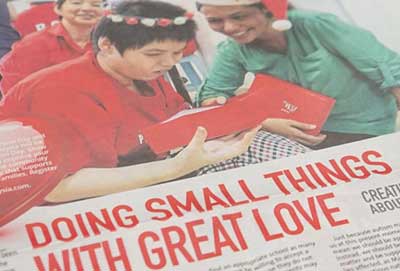
[Feature Article] The Star Newspaper: Doing Small Things With Great Love
On the 2nd of April, which happens to be World Autism Awareness Day, an article written by our director, Jochebed Isaacs, was featured in the Star under Leaderonomics.
—
Doing Small Things With Great Love
Published in: The Star Newspaper, Leaderonomics
Published on: 2nd April 2016
Written by: Jochebed Isaacs

Growing up under my parents’ roof, I have always been taught to look out for the needs of others and to care for the disadvantaged. My parents encouraged me to volunteer at an early age as well as to participate in fundraising activities.
I used to play with children at an orphanage as young as four years of age. By the time I am seven, my mother helped bake rock buns for me to sell to raise money for the Ethiopian famine. As I grew older, I would go on to participate or organise larger fundraising initiatives.
As a young girl, my heart’s desire was to help others, in whatever way I could. I studied psychology because I had initially wanted to study family counselling and to bring restoration among family units.
First-hand Experience With Special Kids
It was towards the end of my degree in Australia that I embarked upon a summer job working with autistic children. I was assigned to work one-on-one with two different children with autism in their homes.
The first couple of weeks were really challenging as the children found it difficult to cooperate and they – because of a lack of communication – would hit me and pull my hair.
The training I had received was also insufficient. looking back, I did not know the numerous strategies I could have used to prevent those situations and to help the children be more successful from the start.
However, after a couple of weeks of doing what I had been taught to do, one of the children started to respond to my instructions.
He responded to his name and even spoke a few words! I was amazed and thought, “What sort of programme is this and does Malaysia know that this sort of progress is possible?”
Creating Autism Awareness
That was when I first heard about Applied Behavioral Analysis (ABA). ABA is not just a treatment option, it is the answer.
Based on countless journal articles, ABA is established internationally as evidence-based treatment and has been found to increase skills in 90% of children with autism. Not only that, almost 50% of children will be able to catch up to their peers through this treatment. This outstanding prognosis have resulted in over 43 states in the United States legalising funding for it, whether through state funding or health coverage.
ABA had, in fact, been practised on a consultation basis by Wisconsin Early Autism Project which is the parent company for Early Autism Project (EAP) Malaysia that started in 2006. I joined their team shortly after its inception in Malaysia
Over the last 10 years, we have worked with over 300 children from 30 different countries and we have seen great success with all our children’s developing skills, although at different paces. Many of the children have learnt to speak and transition to school successfully.
However, there is still a lot more we can do. Many people in Malaysia are not aware of the early signs of autism and are not aware of the appropriate diagnostic tools.
We see families receiving diagnosis of autism for their child, with no clear report or explanation of how the doctor came to that conclusion.
We then see families being ambushed with numerous treatment options, resulting in them being exhausted emotionally, mentally and financially as they pursue different treatment options.
We also see families struggle to find an appropriate school as many schools may not be willing to accept a child with autism because they do not have the training or other parents may complaining.
Bringing it all together
EAP celebrates its 10th anniversary this year and we hope that over the next 10 years, there will be a greater awareness as well as acceptance of autism across the nation.
Autism affects one out of 68 individuals, and very soon we will all know someone with autism or have a family member with autism.
Just because autism may not affect us at this present moment, it does not mean we should be apathetic about it. Instead, we should be well read on this matter and be supportive of other families affected, as Malaysia becomes a more conscientious nation.
We also hope that in the field of autism, Malaysia will become a nation that meets international standards of best practice, that we will establish the adequate governing structures and be on par with other developed nations in services provided, research and resource development.